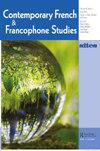奎诺对抗幽默家:结束“幽默的小屏幕”
IF 0.2
4区 文学
0 LITERATURE, ROMANCE
引用次数: 0
摘要
摘要Raymond Queneau战后作为漫画作家的声誉掩盖了作者对植根于法国阴谋集团和贾里圈子的消极幽默的怀疑。在1938年的一篇充满争议的文章《幽默与受害者》中,昆诺揭露了“永恒的幽默”的局限性,他声称必须用一种有分寸的讽刺形式来取代这种局限性,达达在欧洲释放的创造力早就开始了。伊索寓言的矩阵使散文家能够通过贡弗勒芒的形象揭露当代法国幽默家粗鲁的自我重要性,并为重新人性化的创作空间奠定基础,在黑格尔的历史终结意义上,幽默等同于智慧。本文章由计算机程序翻译,如有差异,请以英文原文为准。
Queneau contre les humoristes : pour en finir avec le « petit paravent humour »
Abstract Raymond Queneau’s postwar reputation as comic author belies the suspicion the writer brought to a negativistic stripe of humor rooted in fin-de-siècle French cabarets and Jarry’s circle. In the polemical essay of 1938 “L’humour et ses victimes,” Queneau exposes the limitations of “perpetual humor,” which he claims must be replaced by a measured form of irony, the creative energies unleashed in Europe by Dada having long since run their course. The matrix of the Aesopic fable allows the essayist to lay bare, through the figure of gonflement, the crass self-importance of contemporary French humorists and to establish the grounds for a re-humanized space of creation wherein humor equates with wisdom, in Hegel’s sense of the end of History.
求助全文
通过发布文献求助,成功后即可免费获取论文全文。
去求助
来源期刊

Contemporary French and Francophone Studies
LITERATURE, ROMANCE-
CiteScore
0.30
自引率
0.00%
发文量
43
期刊介绍:
An established journal of reference inviting all critical approaches on the latest debates and issues in the field, Contemporary French & Francophone Studies (formerly known as SITES) provides a forum not only for academics, but for novelists, poets, artists, journalists, and filmmakers as well. In addition to its focus on French and Francophone studies, one of the journal"s primary objectives is to reflect the interdisciplinary direction taken by the field and by the humanities and the arts in general. CF&FS is published five times per year, with four issues devoted to particular themes, and a fifth issue, “The Open Issue” welcoming non-thematic contributions.
 求助内容:
求助内容: 应助结果提醒方式:
应助结果提醒方式:


